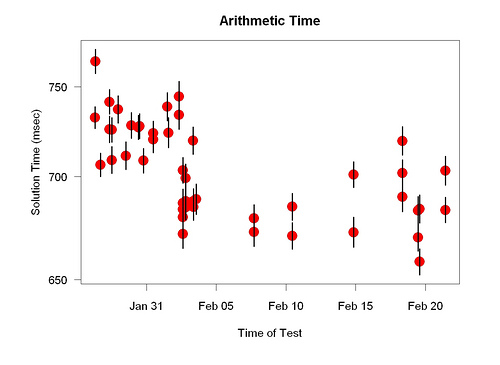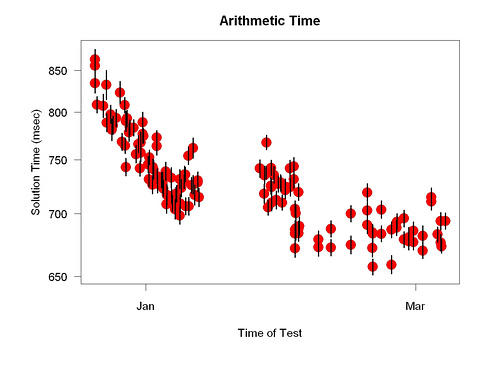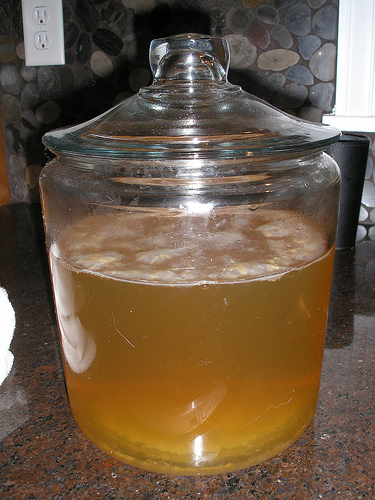- Secrets of the UC Regents
- Very good free clinical nutrition newsletter
- one blog = one self-experiment (does BHT prevent cold sores?)
- excellent interview of Robert Caro (by Brian Lamb)
Month: March 2009
Hey, What Happened to My Brain? (part 2)

As I blogged earlier, my arithmetic performance suddenly improved about a month ago (close-up above). How fast the change: On February 2 at 8 am I took the test; my scores were roughly the same as they had been the past month. At 2 pm the same day, I took the test again and was about 50 msec faster. (In reaction-time experiments, a surprising 50-msec effect is huge.) I remained faster for at least several weeks. Comparing the last 30 sessions before the shift to the first 30 sessions after the shift, t (38) = 11, p = extremely small. In an experiment, comparing treatment and baseline, t> 3 is very good and t > 4 is extremely good.
What might have caused this?
I moved to Beijing in October. Eventually I ran out of the Spectrum Organic flaxseed oil I’d brought with me and started drinking a Beijing brand called Joyful Organic. When I returned to Berkeley I brought a few bottles of it with me and continued to drink it. In late January I ran out; the evening of January 29 I started drinking Spectrum Organic again. Four days later my arithmetic scores sharply improved.
It’s really plausible that the improvement was due to the change in flaxseed oils. Flaxseed oil had made a difference (versus nothing) with a very similar task. A few weeks before the shift, a friend had asked how I knew if my Chinese flaxseed oil was good; I’d said I’d find out when I switched back to Spectrum Organic.
But why was the improvement delayed four days? I started studying flaxseed oil because one evening I took several capsules and the next morning noticed my balance was better. And if the improvement is going to take that long, why would it happen so sharply after the delay? I can’t even begin to answer these questions.
Language and Netbooks
I believe language evolved because it facilitated trade. If you wanted X, being able to say “X?” made it a thousand times easier to find someone with excess X. This efficiency required prior language learning, of course. Language learning happened in the background, so to speak, then paid off in the foreground by making one of human life’s biggest tasks (trading) much easier.
After reading this excellent article about netbooks, I realized they’re like language. All sorts of tasks become much easier for your computer if the heavy lifting is done by a server. You no longer need Word or Photoshop, for example. Just as using language to trade required prior language learning, using netbooks this way requires prior software development.
Lie to Me
The new TV show — I like it. It is based on the work of Paul Ekman, a psychologist who lives in Berkeley. It is a new sort of reality show. It isn’t a 50% reality show (as most reality shows are), it is a 10% reality show. Perhaps 10% of the show involves discussion and illustration of actual research. You learn about it painlessly.
When I was in college, I tried to learn about stuff by finding fun-to-read books on the subject. Genetics, for example. TV was worthless. Educational TV (opera concerts, televised lectures) was dreary and ordinary TV was completely non-educational. Since then, the gap between educational TV and ordinary TV has narrowed a lot: the History Channel, the Food Channel, the Weather Channel, not to mention Frontline, are moderately entertaining and Top Chef and Survivor are mildly educational. But it is still easy to put all these shows on one side or other of the education/entertainment divide.
Lie to Me bridges the gap. Although meant to be seen as entertaining, it’s undeniably educational. I wish there was an entertaining show I could watch to learn Chinese. There isn’t even an entertaining book!
———————————————————————————–
Buy direct sat tv
Hey, What Happened to My Brain? (part 1)
For a few months, I’ve been measuring how well my brain is working using arithmetic problems. Each test session includes 100 simple problems (3+4, 7-0, 4*8) divided into 5 blocks of 20. I type the last digit of the answer as quickly as possible. I got the idea from Tim Lundeen, who got better on a similar task when he increased his DHA intake. My performance on an earlier version of this task was improved by flaxseed oil.
I’ve blogged about this. The virtues of this test include: 1. Fast. Takes only a few minutes. 2. Portable. Requires only a laptop. 3. Many possible answers (1, 2, 3, etc.). This reduces anticipation errors. 4. Many numbers (reaction times) per test. This allows me to get a measure of variability for each session and can correct for the difficulty of the problem. Aspects with room for improvement include: 1. Speed/accuracy tradeoff. Accuracy isn’t fixed. Depending on how accurate I want to be, I’ll go faster or slower. (I aim for 95% correct.) 2. No complex actions. The most enjoyable games have a motor-skill aspect that this task does not.
Here’s the data so far.

The big gap happened because I moved from Beijing to Berkeley. The most fascinating result, of course, is the sudden drop on February 2. Here is a close-up.

The drop was easy to notice. All of a sudden I was faster (and only slightly less accurate). The first test with better performance took place while my landlady, who lives upstairs, was practicing piano. Usually it’s quiet when I test myself. My first thought was that the music had caused the improvement. But it persisted so long after the music had stopped that the music couldn’t be the cause.
Part 2: I think I know what caused it. But there is a big problem with my explanation.
Polyphasic Sleep
I heard about polyphasic sleep — such as sleeping 20 minutes every 3 hours — many years ago. But now I can learn about it in much more detail — and with much more suspense. For example:
[Before starting] Having always been a night-owl, and never having a sleep pattern that fits with others, I feel drawn to try it. I foresee a problem in that I have always felt that I need 8 hours of sleep per day, but on the other hand I can stay up until 5 am without a problem when I am mentally engaged, so it has seemed to me for quite some time that a 28 or 29 hour day is what my system is tuned for. . . . I can feel it energizing me already. [Day 15] Yesterady was a disaster. Sleep is a funny thing – sleep deprivation had been accumulating and I wasn’t really noticing it. I was just happy to be awake and productive so many hours in a day that I ignored the weird feeling in my head, just going with it, thinking I would adjust and it would be all ok. Well yesterday morning I blew up at my SO for a ridiculous reason. . . . What went wrong? I was following all the sleep patterns pretty much to the letter.
More examples listed here.
More Benefits of Fermented Foods?
At a regular dental checkout a few days ago, I was told my gums were in excellent shape — better than the previous checkup. The only difference between the two checkups I can think of is that now, but not then, I’ve been eating lots of fermented foods. My gums clearly got a lot better after I started drinking flaxseed oil (went from reddish to pinkish). Now apparently they have improved again.
After the checkup I went to Whole Foods to buy kombucha. The person behind me in the checkout line was also buying kombucha. She had learned about it from friends. “You drink it because your friends drink it?” I asked. No, she likes how it makes her feel. It gives her more energy. “Does any other drink do that?” I asked. She pointed to the coffee she was also buying: Coffee has the same effect, she said. Since kombucha is made from tea, it certainly contains caffeine. On the other hand, I noticed an increase in energy after I started eating more fermented foods that contained no caffeine, such as stinky cheese, wine, yogurt, and kimchi.
“I Started Eating More Fermented Food…” (continued)

Previously: Tucker Max found that drinking two bottles per day of kombucha for a a week had several easy-to-notice unexpected benefits.
I have some comments:
1. The best thing about these observations is how simple the change is: two bottles/day of a readily available kombucha brand. Very easy to duplicate — let’s not worry about matching Tucker’s weight, etc.
2. The speed with which the changes were noticed (within a week) makes the whole thing even easier to try to duplicate.
3. Kombucha was not one of the fermented foods from which I drew my conclusions about fermented foods. Bacteria are so varied that the notion that all fermentation bacteria have somehow the same effect isn’t easy to believe. But since the prediction about fermented foods (they are highly beneficial) turned out to be true maybe there is something to this.
4. My idea that we like umami tastes, sour tastes, and complex flavors so that we will eat more bacteria-laden food (which nowadays would be fermented food) is saying that we need plenty of these foods. Why else would evolution have tried so hard to make us eat them? The implication is they should be part of every diet, like Vitamin C. When someone deficient in any vitamin begins eating that vitamin, the deficiency symptoms go away very quickly, within a few weeks, usually. The changes are easy to notice. So the details of what Tucker observed – the speed and size of the improvements — support my general idea that there is a widespread deficiency here that can be easily fixed.
5. I used to make kombucha. I’m going to start again.
Why Self-Experimentation?
One reason for self-experimentation is very simple: To learn about the effects of a drug you are taking. Is it helping? The medical literature is unlikely to be unbiassed. Someone heavily involved in producing that literature wrote anonymously in the BMJ:
I also do a lot of ghost writing. Sometimes I report good quality studies to which I am proud to contribute, albeit anonymously. Yet, too often, I write so called reviews, amounting to mere panegyrics of the discussed drugs, or I report poorly designed and implemented “epidemiologic” studies, bearing gross biases. Many of the (paid) signing authors of these papers do not read the manuscript, let alone provide feedback. I am surprised at how easily such papers are accepted by some journals and how rarely their flaws are challenged.
Given the financial interests at stake, I do not see what recommendations or regulations will put an end to such long debated [meaning long-criticized] practices.
My first self-experimentation to have unexpected results involved an acne drug. I discovered it was ineffective — might have even been making things worse. Yet it was a standard treatment for acne. My dermatologist was surprised I had bothered to collect the data. “Why did you do that?” he asked.
To do useful self-experimentation here isn’t complicated. The main thing you would do would be to measure the problem before and while you take the drug. Before you take the drug, you’d want to measure the problem long enough so that you had some idea of what would happen if you didn’t take the drug.
If you’ve done this, I’d like to hear about it.
Another Benefit of Fermentation: Better Extraction of Nutrients
Whole Health Source says:
Healthy grain-based African cultures typically soaked, ground and fermented their grains before cooking, creating a sour porridge that’s nutritionally superior to unfermented grains. . . .These traditional food processing techniques [soaking and fermentation] have a very important effect on grains and legumes that brings them closer in line with the “paleolithic” foods our bodies are designed to digest. They reduce or eliminate toxins such as lectins and tannins, greatly reduce anti-nutrients such as phytic acid and protease inhibitors, and improve vitamin content and amino acid profile. Fermentation is particularly effective in this regard.
For me the key word is sour (“sour porridge”) — another example of how our enjoyment of umami- sour- and complex-flavored foods drew us toward fermented food.
A paper showing that some types of fermentation increase iron and zinc digestion.
Thanks to Justin Owings and Tom.